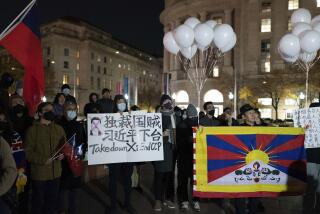China Denies Return to Collectives
- Share via
PEKING — Some of China’s 800 million peasants have begun to voice fears that the government is attempting to force them back into cooperative or collective farms this year in order to increase the nation’s grain harvest.
During the past few months, reports from rural areas have indicated that many peasants feel that the Chinese regime is now seeking to discourage the development of “specialized households”--that is, peasant families who work individually in sideline occupations as well as, or instead of, tilling the soil.
The specialized households have been one of the key elements of the rural reform program instituted under Chinese leader Deng Xiaoping in 1979.
“Certain rumors circulating in the rural areas (are) causing mental turmoil among the masses,” a local radio report in the city of Xian in Shaanxi province said. In particular, the report said, word had begun to spread “to the effect that agricultural cooperatives would be re-established and collective farms set up.”
The Communist regime insists that these reports are not true. During the past two weeks, however, it has begun to acknowledge the existence of the rumors in the countryside and to emphasize that the government’s commitment to the original agricultural reform program remains as strong as ever.
“Some specialized households have become anxious and dispirited,” the Communist Party newspaper People’s Daily said. “Many peasants are asking whether the policies will change again.”
No Change in Official Policy
Nevertheless, the newspaper went on, “there is no change in the party’s policy of allowing and encouraging some people to get rich ahead of others through hard work, nor will there be any change.” The People’s Daily commentary appeared to be aimed at least in part at local Communist Party officials in the countryside who may be using the nation’s renewed emphasis on grain production as a means of regaining some of the power that they lost under the rural reform program.
Under Deng, the rural communes set up under Mao Tse-tung have been abolished. China’s peasants have been allowed to grow grain on their own family plots and to develop other individual specialties such as making handicrafts, breeding livestock or poultry and working in rural industry.
At the outset, the reform program led to steady increases in grain production. From 1980 to 1984, China’s grain harvest increased each year, and in 1984 it reached a level of 407 million tons, the largest harvest in the history of China or any other nation.
But last year, it dropped to 380 million tons, the first decrease in half a decade. Authorities blamed the decrease in part on bad weather but acknowledged that it was also due to a sharp decrease in the amount of acreage in China being devoted to grain.
Throughout the Chinese countryside last year, peasants acknowledged that they were shifting land away from rice and wheat and were planting more profitable crops. They had strong economic incentives to do so, because the regime has kept price controls on rice and bread while lifting controls on fruit, vegetables, meat and other commodities.
At a national conference of Communist Party leaders last September, Chen Yun, a conservative member of the Standing Committee of the Politburo and veteran economic specialist, warned that “some peasants are no longer interested in growing grain.”
Too Much Emphasis on Rural Industry
He suggested that the reform-minded leadership had put too much emphasis on rural industry. Since then, even Deng’s allies and proteges within the party leadership have begun to stress the importance of grain output.
“China must not treat grain production lightly but should keep increasing it steadily,” Vice Premier Tian Jiyun said at an agricultural conference last month.
Warnings such as these have apparently prompted local officials in the countryside to seek to discourage the further development of rural industries and sideline occupations for the peasants.
People’s Daily admitted that “some people say that all the gains of the specialized households that became rich ahead of others were ill-gotten, and some cadres no longer support the specialized households.” The newspaper made clear that these attitudes run counter to the policy of the Communist Party leadership.
During the past winter, tens of millions of Chinese peasants were put to work in what was called a “mass irrigation army” aimed at improving water conservation projects with an eye toward increasing the grain harvest this year.
That mass mobilization campaign, reminiscent of earlier ones launched under Mao’s leadership, may also have contributed to the fears and rumors among Chinese peasants that the Deng regime was retreating from its rural reform program.
The official New China News Service reported recently that the amount of land devoted to grain in China this year will be larger than it was last year but less than in the record year of 1984. The report was based on a survey of 84,000 rural households.
More to Read
Sign up for Essential California
The most important California stories and recommendations in your inbox every morning.
You may occasionally receive promotional content from the Los Angeles Times.













